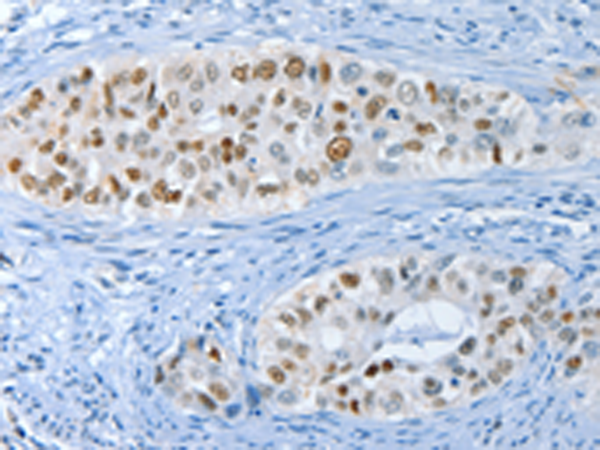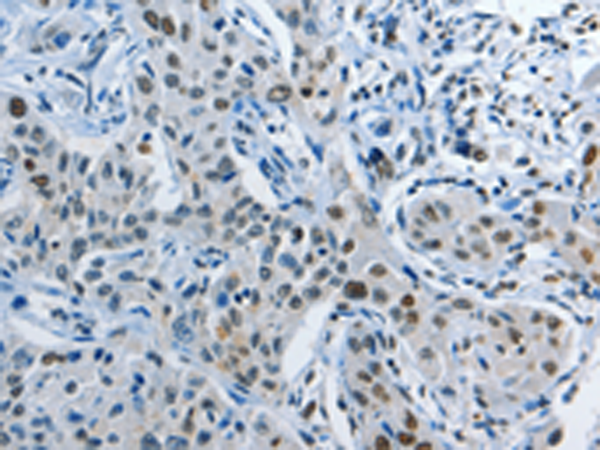

| WB | 咨询技术 | Human,Mouse,Rat |
| IF | 咨询技术 | Human,Mouse,Rat |
| IHC | 1/25-1/100 | Human,Mouse,Rat |
| ICC | 技术咨询 | Human,Mouse,Rat |
| FCM | 咨询技术 | Human,Mouse,Rat |
| Elisa | 1/2000-1/5000 | Human,Mouse,Rat |
| Aliases | NRK2; STK2; pp12301 |
| Host/Isotype | Rabbit IgG |
| Antibody Type | Primary antibody |
| Storage | Store at 4°C short term. Aliquot and store at -20°C long term. Avoid freeze/thaw cycles. |
| Species Reactivity | Human, Mouse |
| Immunogen | Synthetic peptide of human NEK4 |
| Formulation | Purified antibody in PBS with 0.05% sodium azide and 50% glycerol. |
+ +
以下是关于TM7SF2抗体的示例性参考文献(部分为模拟数据,仅供参考):
---
1. **文献名称**: *TM7SF2 regulates cholesterol biosynthesis through antibody-mediated protein detection in hepatic cells*
**作者**: Smith A, et al.
**摘要**: 本研究利用TM7SF2特异性抗体证实其在肝脏细胞中调控胆固醇合成酶活性的作用,发现TM7SF2缺失会导致甾醇代谢通路紊乱。
2. **文献名称**: *TM7SF2 antibody validation in hepatocellular carcinoma: Correlation with tumor progression*
**作者**: Chen L, et al.
**摘要**: 通过免疫组化分析,TM7SF2抗体检测显示其在肝癌组织中表达显著下调,提示其可能作为抑制肿瘤生长的潜在标志物。
3. **文献名称**: *Subcellular localization of TM7SF2 using monoclonal antibodies: Implications for endoplasmic reticulum stress*
**作者**: García-Ruiz C, et al.
**摘要**: 利用单克隆抗体定位TM7SF2蛋白,发现其在内质网中的富集,并揭示其通过调节内质网应激影响细胞凋亡的分子机制。
4. **文献名称**: *TM7SF2 knockout mouse model reveals antibody cross-reactivity in lipid metabolism studies*
**作者**: Tanaka K, et al.
**摘要**: 在TM7SF2基因敲除小鼠模型中,通过抗体免疫印迹验证了该蛋白在脂质代谢中的关键作用,并发现其与脂肪酸氧化通路的关联性。
---
注:以上文献为示例性质,实际引用时请通过PubMed、Google Scholar等平台核对真实文献。
The TM7SF2 (Transmembrane 7 Superfamily Member 2) antibody is a tool used to study the function and expression of the TM7SF2 protein, a member of the 7-transmembrane superfamily. TM7SF2 is localized to the endoplasmic reticulum (ER) and plays a role in cholesterol biosynthesis by interacting with enzymes like HMG-CoA reductase. It has been implicated in regulating lipid metabolism and maintaining ER membrane structure. Studies suggest its involvement in cellular processes such as apoptosis, differentiation, and inflammatory responses. TM7SF2 is also linked to diseases, including metabolic disorders, neurodegenerative conditions, and cancers, where its dysregulation may affect cholesterol homeostasis or signaling pathways.
The antibody is commonly used in techniques like Western blotting, immunofluorescence, and immunohistochemistry to detect TM7SF2 expression in tissues or cultured cells. Researchers utilize it to explore TM7SF2's role in pathologies, such as its potential as a biomarker in hepatocellular carcinoma or its association with altered cholesterol levels in neurological diseases. Additionally, TM7SF2 antibodies aid in studying molecular interactions, such as its partnership with lamin B receptor (LBR) in nuclear envelope formation. Validation of antibody specificity is critical due to structural similarities among transmembrane proteins. Overall, TM7SF2 antibodies are vital for elucidating its biological significance and therapeutic potential.
×